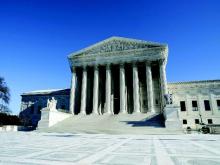The U.S. Supreme Court has ruled that two Texas abortion restrictions are unconstitutional and place a substantial obstacle in the path of women seeking abortions. In a 5-to-3 vote, justices ruled that both provisions of HB 2 create an “undue burden” on abortion access. The court struck down both requirements, reversing a decision by the 5th Circuit.
The majority justices found the requirements – mandating that abortion providers have admitting privileges at a hospital within 30 miles of an abortion clinic in order to provide the service, and that all abortion clinics meet the same requirements as ambulatory surgical centers (ASCs) – are unnecessary and offer little medical advantage to patients.
“The surgical-center requirement provides few, if any, health benefits for women, poses a substantial obstacle to women seeking abortions, and constitutes an ‘undue burden’ on their constitutional right to do so,” wrote Associate Justice Stephen B. Breyer. “Before this requirement was enacted, Texas law required abortion facilities to meet a host of health and safety requirements that were policed by inspections and enforced through administrative, civil, and criminal penalties. Record evidence shows that the new provision imposes a number of additional requirements that are generally unnecessary in the abortion clinic context.”
The majority court added that common sense also suggests that a “physical facility that satisfies a certain physical demand will generally be unable to meet five times that demand without expanding physically or incurring significant costs.” Texas did not provide evidence that such expansions were possible, justices said.
Chief Justice John G. Roberts dissented, along with Associate Justice Samuel Alito Jr. and Associate Justice Clarence Thomas, calling the decision a departure from the court’s obligation to find fairly.
“[The] decision exemplifies the court’s troubling tendency to bend the rules when any effort to limit abortion, or even to speak in opposition to abortion, is at issue,” Associate Justice Thomas wrote in his dissent. “As Justice Alito observes … today’s decision creates an abortion exception to ordinary rules of res judicata, ignores compelling evidence that Texas’ law imposes no unconstitutional burden, and disregards basic principles of the severability doctrine.”
Whole Woman’s Health v. Hellerstedt centered on whether two Texas abortion regulations unconstitutionally restrict women’s access to the procedure. One rule requires abortion providers to have admitting privileges at a hospital within 30 miles and another rule requires abortion clinics to meet the same standards as those of ambulatory surgical centers. The plaintiffs, who are clinics and doctors, argued that both restrictions are unnecessary and limit access to abortion services. The Texas Department of State Health Services argued that the restrictions are reasonable and effective measures that raise the standard of care for abortion patients and ensure health and safety. The 5th U.S. Circuit Court of Appeals sided with the state; the clinics and physicians appealed.
The plaintiffs also asked the Supreme Court to reaffirm prior rulings that outline when a new abortion law imposes an “undue burden” on a patient’s right to end a pregnancy. The standard results from a 1992 Supreme Court decision, Planned Parenthood of Southeastern Pennsylvania v. Casey, in which the justices affirmed abortion rights established in Roe v. Wade.
The plaintiffs also wanted the Supreme Court to instruct lower courts to weigh whether new state restrictions on abortions really serve to protect patient health. The 5th U.S. Circuit Court of Appeals refused to answer this question when it ruled in favor of Texas in 2015, stating that courts must accept that new laws brought before them would serve the public interest.
More than 70 groups and organizations issued friend-of-the-court briefs to the Supreme Court in the case, including 45 briefs in support of the plaintiffs. In its Jan. 4 brief to the Supreme Court, the American College of Obstetricians and Gynecologists argued that the Texas restrictions are inconsistent with accepted medical practice and provide no benefit to patient care.
On Twitter @legal_med


